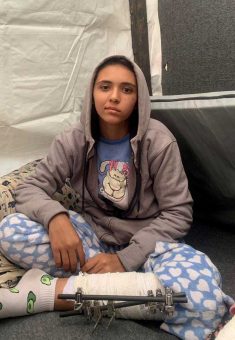A 21-year-old public relations student and resident of the Mukhabarat Towers in Gaza City, Nihal described the bombing of her uncle’s home that killed her sisters and living in a DIP camp:

Soon after the war began, there was heavy bombing all over Gaza City. On 12 October 2023, we received phone calls and texts from the Israeli army telling us to vacate our building, Tower 3 of the Mukhabarat Towers, because they were going to bomb it. The tower had 11 stories, and I lived in one of four apartments on the third floor with my parents, two of my sisters and my brothers. Another sister was married and didn’t live with us. I’m engaged and was supposed to get married in November.
Some people left the building as soon as the war began, because of the bombings. I left with my mother and sisters on 12 October. We went to stay with my aunt, Samira a-Najar, 55, in Jabalya Refugee Camp. My father and brothers stayed home. But that day, Tower 1 was bombed and they moved to the Mashtal Hotel northwest of Gaza City. Then there were bombings near the hotel, too, so they told us they were moving to the makeshift displaced persons’ camp at the UNRWA training compound in Khan Yunis.
We stayed at my aunt’s place for about two weeks. There was bombing around us all the time, and bits of glass kept flying our way. On 24 October, my aunt got a text from the Israeli army saying we had to vacate the house because they were going to bomb it. We went to stay with my uncle Muhammad, 40, who also lived in the camp in a ground-floor apartment.
The next day, 25 October, at around 7:00 P.M., I was sitting in the living room with my mother, my sister Mays, my uncle’s wife Khulud, their two-month-old baby Mahmoud, and three of their daughters, Shahd, 15, Wa’d, 13, and Jana, 10. My sisters Muna and Nur were in another room. My uncle Muhammad was out, and their daughter Ghazal, 11, was at the neighbors’ place charging her phone. Suddenly, we found ourselves under rubble.
There were ten of us, and we didn’t know who was alive and who was dead. We didn’t hear the bombing itself, just suddenly found ourselves under a pile of rubble. People came to help us. I don’t know exactly what happened next. There was so much smoke and debris, I couldn’t see anyone.
I blacked out and woke up in the Indonesian Hospital north of Gaza City. My mother was also there, with third-degree burns on her face, arm, back and legs. I was injured in both hands and they put platinum implants in my fingers and in my left leg. Mays had burns, too, and wounds that were stitched.
I was told my two sisters Muna and Nur were killed, and that Khulud, her baby boy and her daughters who were with us were killed, too. When I found out, I cried and shouted. I couldn’t calm down. I still can’t stop crying over them. The next morning, they were buried at the Beit Lahiya graveyard north of Gaza City. I stayed in hospital with my mother and Mays, and we couldn’t attend the funeral.
My fiancé, Yaser Mhanna, 30, took me from the Indonesian Hospital to a-Shifaa Hospital in Gaza City, and my mother and Mays stayed at the Indonesian Hospital. But then the bombings around a-Shifaa got heavier, and we decided to leave and go south, to Khan Yunis. We got to Netzarim Checkpoint on foot, with me in a wheelchair. After the checkpoint, we took a donkey cart and then a truck. At about 5:00 P.M., we got to Khan Yunis. The next day, my mother and Mays also arrived. They had to escape, too, because there was heavy bombing around the Indonesian Hospital as well.
We’ve been at the displaced persons’ camp in Khan Yunis for about a month. We met my father and brothers here. The conditions are very bad. We’re living in a tent made of nylon and stiff fabric. We arrived only with the clothes on our backs, injured. Every day, we go to the Japanese Hospital by the camp to change bandages. People gave us blankets and clothes.
There’s no toilet nearby, and we have to walk about 100 meters to get to one. Every time we need the bathroom, our brothers take us because it’s hard for us to walk.
All my dreams are gone. My sisters were killed, my home was bombed. The wedding dresses and my gold jewelry are under the rubble. The Israeli army left me with nothing. No hope for happiness. It took away every sweet thing in my life. Our lives are terrible now. I cry all the time over my sisters, over the situation, over the hopelessness of it all.
The people killed in the bombing of Muhammad a-Najar’s home:
Muna Nidal Hussein a-Najar, 20
Nur Nidal Hussein a-Najar, 18
Khulud Mas’ud, 30, and her children:
Shahd Muhammad Hussein a-Najar, 15
Wa’d Muhammad Hussein a-Najar, 13
Jana Muhammad Hussein a-Najar, 10
Mahmoud Muhammad Hussein a-Najar, 2 months
* Testimony given to B’Tselem field researcher Olfat al-Kurd on 24 December 2023.